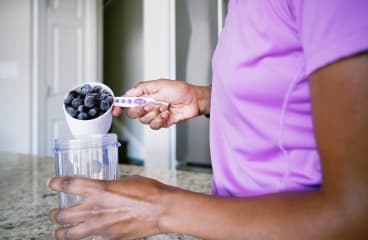Our Health Library information does not replace the advice of a doctor. Please be advised that this information is made available to assist our patients to learn more about their health. Our providers may not see and/or treat all topics found herein.
Topic Contents
Diabetes: Counting Carbs
Overview

Managing the amount of carbohydrate (carbs) you eat is an important part of planning healthy meals when you have diabetes. Carbs raise blood sugar more than any other nutrient. Carbs are found in grains, starchy vegetables, fruits, and milk and yogurt. Carbs are also found in sugar-sweetened foods and drinks.
The more carbs you eat at one time, the higher your blood sugar will rise. Counting carbs can help you keep your blood sugar within your target range.
If you use insulin, counting carbs helps you match the right amount of insulin to the number of grams of carbs in a meal.
Getting started
Carbohydrate counting means keeping track of how much carbohydrate you eat at meals and snacks. It helps you keep the amount of carbs you eat within a target range. Here's how to get started.
- Learn which foods have carbs.
- Bread, cereal, pasta, and rice have about 15 grams of carbs in a serving. A serving is 1 slice of bread (1 ounce), 1/2 cup of cooked cereal, or 1/3 cup of cooked pasta or rice.
- Fruits have 15 grams of carbs in a serving. A serving is 1 small fresh fruit, such as an apple or orange; 1/2 of a medium banana; 1/2 cup of canned or frozen fruit; 1/2 cup of fruit juice; 1 cup of melon or berries; or 2 tablespoons of dried fruit.
- Milk and no-sugar-added yogurt have 15 grams of carbs in a serving. A serving is 1 cup (237 mL) of milk or 3/4 cup (6 oz) of no-sugar-added yogurt.
- Starchy vegetables have 15 grams of carbs in a serving. A serving is 1/2 cup of mashed potatoes or sweet potato; 1 cup winter squash; 1/2 of a small baked potato; 1/2 cup of cooked beans; or 1/2 cup cooked corn or green peas.
You can use your hand to help you estimate the serving sizes of foods.
- Learn how many carbs to eat each day and at each meal.
A registered dietitian or diabetes educator can help you learn to count carbs. And children, especially, need to work with a health professional to plan their carb goals. Here is an example of a carb guideline for an adult. Your carb needs may be different.
- 45 to 60 grams at each meal.
- 15 to 20 grams at each snack.
- Try to eat about the same amount of carbs at each meal.
Don't "save up" your daily allowance of carbs to eat at one meal.
Eating a balanced diet
Here are some tips for eating a healthy, balanced diet when you count carbs.
- Work with a registered dietitian or a diabetes educator.
They can help you plan the amount of carbohydrates to include in each meal and snack.
- Pay attention to serving sizes.
- Read food labels to find carb amounts and the serving size.
- It might be helpful to measure and weigh your food when you are first learning to count carbs.
- Choose lean protein sources.
Foods that contain lean protein (such as beans, tofu, chicken, and fish) are an important part of a balanced diet.
- Eat less saturated fat.
Choose unsaturated fats like canola oil and olive oil instead of butter or shortening. Nuts and seeds, fatty fish, and avocados are other healthy fat sources.
Helping a child who has diabetes
Carb counting can allow your child to eat a variety of foods, just like other kids. It can also help your child feel more in control and more confident in managing diabetes.
- Use your child's meal plan to help you and your child work together to select food for your child's meals and snacks.
High-sugar foods or sweets should be eaten only sometimes and in smaller servings than starches, fruits, and milk.
- Check your child's blood sugar level often.
If you check it before and 1 to 2 hours after a meal, you will be able to see how the food your child eats affects their blood sugar.
- Think about insulin needs.
If your child needs mealtime insulin, you might be taught to adjust the amount of insulin needed to cover the amount of carbohydrate your child eats.
- Try writing down what your child eats and how it affects their blood sugar.
You can review this with your child's diabetes care team.
Related Information
Credits
Current as of: October 7, 2024
Author: Ignite Healthwise, LLC Staff
Clinical Review Board
All Ignite Healthwise, LLC education is reviewed by a team that includes physicians, nurses, advanced practitioners, registered dieticians, and other healthcare professionals.
Current as of: October 7, 2024
Author: Ignite Healthwise, LLC Staff
Clinical Review Board
All Ignite Healthwise, LLC education is reviewed by a team that includes physicians, nurses, advanced practitioners, registered dieticians, and other healthcare professionals.
This information does not replace the advice of a doctor. Ignite Healthwise, LLC disclaims any warranty or liability for your use of this information. Your use of this information means that you agree to the Terms of Use and Privacy Policy. Learn how we develop our content.
To learn more about Ignite Healthwise, LLC, visit webmdignite.com.
© 2024-2025 Ignite Healthwise, LLC.




